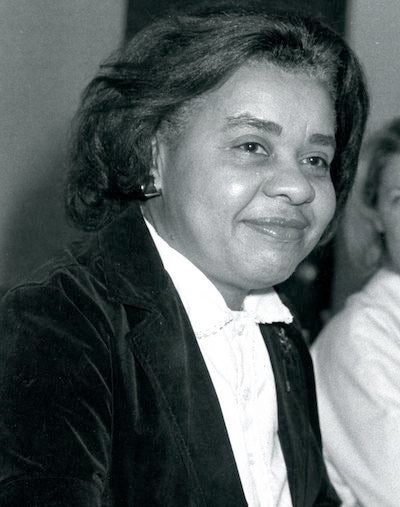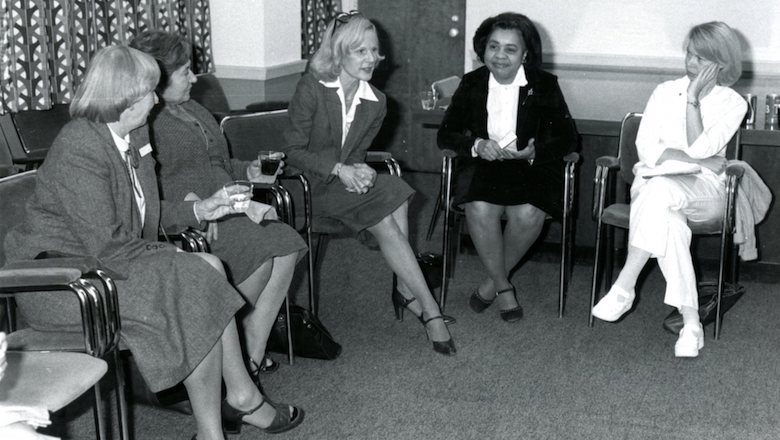Women’s History Month 2021 — Renowned Nurse Leader Had Georgetown Connection
March 17, 2021 – Four decades ago, distinguished nurse leader Vernice D. Ferguson (1928-2012) shared her expertise on Georgetown’s campus through the Dean’s Lecture and Nursing Leadership Series Forum, which was held in the fall of 1980.
A copy of Ferguson’s C.V. and other biographical materials, housed in the Georgetown University Archives, mention the lecture and illuminate a lifetime of achievement.
During her career, Ferguson led the nursing department at the National Institutes of Health Clinical Center and was the national chief of nursing for the U.S. Department of Veterans Affairs, according to a copy of a department press release about her 1992 retirement.
(Watch a 2004 video of Ferguson speaking at the NIH Clinical Center during National Nurses Week.)

Internationally renowned nurse leader Vernice D. Ferguson while visiting Georgetown’s campus, likely for the Dean’s Lecture and Nursing Leadership Series Forum in November 1980. Ferguson, who received her bachelor’s degree at NYU and her master’s degree at Columbia, went on to distinguished leadership roles in nursing at the National Institutes of Health and the U.S. Department of Veterans Affairs. (Photo courtesy Georgetown University Archives. The group photo above is also included in Dr. Alma Woolley’s 2001 history of the School of Nursing.)
Additionally, Ferguson served as American Academy of Nursing president and was one of three fellows selected as an academy Living Legend in 1998. While working as a leader in the federal government, Ferguson also had adjunct and affiliated faculty appointments at Georgetown and the University of Maryland, respectively – documents note.
‘Outstanding Contribution’
In her role at the department, Ferguson was “responsible for the clinical, administrative, educational and research activities of the nation’s largest nursing service – some 63,000 nursing personnel in VA facilities across the country,” the press release added.
Eight years earlier, in 1984, the VA celebrated that Ferguson had been selected for fellowship in the Royal College of Nursing.
“The Fellowship, awarded to non-British nationals only in rare instances, is granted in recognition of outstanding contribution to the advancement of the science and art of nursing,” the press announcement said. “The three other recipients this year are from England.”
‘Around the World’ Example
Following her selection, Rep. G.V. “Sonny” Montgomery (D), chair of the House Committee on Veterans’ Affairs, wrote Ferguson a letter of congratulations. He also praised her achievement, which is documented in the Congressional Record on October 2, 1984 along with the Royal College’s statement.
“Vernice Ferguson takes a positive and balanced approach to her career as nurse, educator, researcher, author and administrator, as well as in her own life, in which she strives for professional excellence combined with public service,” the college’s statement reads in part, noting her Georgetown connection and calling her “an example to others around the world.”
Lifetime of Achievements
Archival materials highlight awards and achievements, publications, and speaking engagements – including service as president of Sigma Theta Tau, nursing’s international honor society, and receiving the Mary Mahoney Award from the American Nurses Association.
When she was honored by ANA in 1970, Ferguson became the first Illinois-based nurse to receive the Mahoney Award, according to the Chicago Daily Defender. (Mary Eliza Mahoney, according to the National Women’s History Museum, was “the first African American licensed nurse.”)
Quoted in the newspaper, Ferguson said, “Young black men and women need successful examples to feel comfortable about entering the health professions.” The article explained that Ferguson “has been in great demand for assisting in opportunities in health careers for young black people, especially in nursing.”
A ‘Trailblazer’
In 1974 – in a Washington Star-News article about daylight saving time – Ferguson was quoted, offering insight about her dedication to her work: “I accept it. I can’t get concerned about the time. It’s dark when I leave and dark when I return. My day is a long one. Time changes are unimportant.”
Nearly two decades later, after her retirement from the federal government, Ferguson became senior fellow on cultural diversity at the University of Pennsylvania School of Nursing, according to a January 1993 article in the Philadelphia Daily News.
When Ferguson died at age 84 in 2012, an obituary highlighted her contributions, characterizing the renowned nurse leader’s life in one word: “trailblazer.”
By Bill Cessato
The author thanks Lynn Conway, the university archivist, for sending materials highlighting Ms. Ferguson, including her curriculum vitae, photos, press releases, and information related to Congressman Montgomery and the Congressional Record.
- Tagged
- Nursing History

